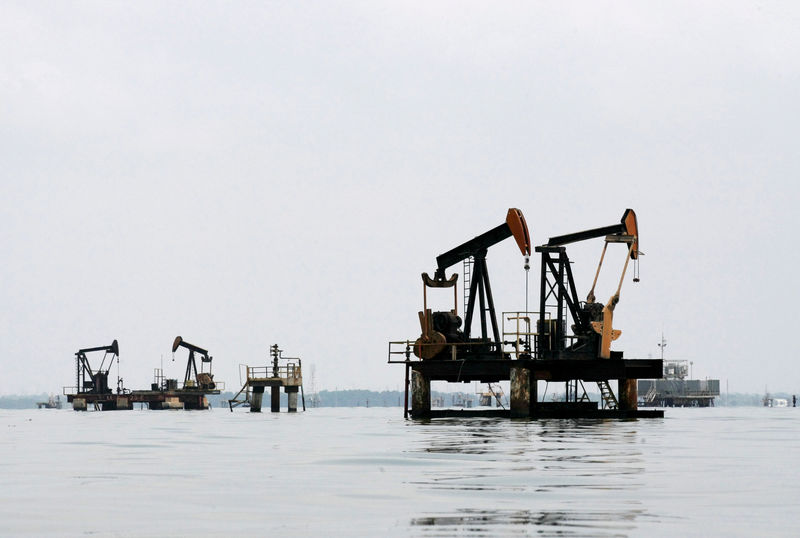 © Reuters. FILE PHOTO: Oil pumps are seen in Lake Maracaibo, in Lagunillas, Ciudad Ojeda, in the state of Zulia, Venezuela
© Reuters. FILE PHOTO: Oil pumps are seen in Lake Maracaibo, in Lagunillas, Ciudad Ojeda, in the state of Zulia, VenezuelaBy Marianna Parraga and Alexandra Ulmer
MEXICO CITY/CARACAS (Reuters) – Royal Dutch Shell Plc (AS:) is negotiating the sale of its stake in a Venezuelan oil joint venture to Paris-based Maurel & Prom (PA:), three sources said this week, a move to scale down its crude business in the ailing OPEC-member country to focus on gas.
The Anglo-Dutch company is seeking to sell its 40 percent stake in Petroregional del Lago, a joint venture with Venezuela’s state-run oil company PDVSA [PDVSA.UL] in the western state of Zulia near Colombia.
The area has been plagued by frequent theft of equipment and near-daily power cuts as Venezuela remains mired in deep recession, hyperinflation and chronic shortages of food and medicine.
Foreign companies also have complained in private that joint ventures with PDVSA are stymied by convoluted bureaucracy, dodgy contracts, and lack of resources, according to dozens of sources in the industry.
At Petroregional, Shell has grown frustrated by delays in receiving dividends from PDVSA and a ban on minority partners independently exporting production, one of the sources said. That has deprived Petroregional, which in 2016 produced about 33,000 barrels per day (bpd) of crude, of much-needed income and dented profitability, the source added.
Its potential sale is being analyzed by Venezuela’s Oil Ministry, according to two of the sources. The sources asked to remain anonymous because they were not authorized to speak about the negotiations.
In the last few weeks a disagreement with Venezuela has emerged over a fee called an entrance bonus that Maurel & Prom would have to pay to the government, as required by Venezuelan law, to gain access to the field’s reserves, two of the sources said.
Negotiations are currently on hold, they added.
“Everything was going very well but suddenly there were discrepancies over the entrance bonus,” one of the sources said.
The persons were unaware of a possible price tag negotiated between Shell and Maurel & Prom, whose main stakeholder is Indonesian state energy firm Pertamina [PERTM.UL].
Shell declined to comment. Maurel & Prom, Pertamina, PDVSA and Venezuela’s Information Ministry did not immediately respond to a request for information.
Pertamina in 2013 tried to enter Venezuela by buying a stake in another joint venture, Petrodelta, but did not receive government approval.
Maurel & Prom has traditionally been focused on Africa, but it has also formed strategic alliances with Toronto-based Frontera Energy Corp (TO:) in Colombia and Peru in recent years. One of the sources said Maurel & Prom was planning to buy Petroregional as part of a consortium.
“There are Venezuelan investors involved in the purchasing consortium,” the person said. The identity of the investors was not immediately clear.
UNRAVELING INDUSTRY
Shell’s potential scale-back comes as Venezuela’s oil industry, home to the world’s biggest crude reserves, is in meltdown. Its oil output declined again in September to 1.434 million barrels per day (bpd), OPEC data showed on Thursday, knocking down the annual average to a six-decade low.
Workers unable to feed their families on PDVSA wages are quitting in droves, underinvestment has left many installations in precarious conditions, and the production drop has accelerated under new military management.
Shell was a pioneering firm in Venezuela and has operated in its oil industry for more than a century. But it has maintained a low profile in Venezuela since late President Hugo Chavez nationalized swaths of the energy sector in 2007, converting all oil projects into PDVSA-controlled joint ventures.
Petroregional, which operates the Urdaneta Oeste crude field in Venezuela’s traditional oil hub of Maracaibo Lake, is Shell’s only crude operation in Venezuela. In recent years, production has plummeted in what used to be the country’s most important crude producing zone, Zulia state.
Exiting Petroregional would allow Shell to focus more on , a priority for the company.
Under a plan still under negotiation with Venezuela, Shell is pushing for a deal to let it produce gas in the Dragon field, one of four areas that form part of the Mariscal Sucre offshore project in the Caribbean sea. Shell has said the gas would be processed at facilities it operates in Trinidad and Tobago.
Shell in 2016 completed the $52 billion purchase of BG Group, creating the world’s largest trader of liquefied natural gas (LNG). The takeover and other purchases gave Shell greater access to gas operations in Trinidad, a few kilometers from Venezuela’s eastern coast.
Source: Investing.com





























